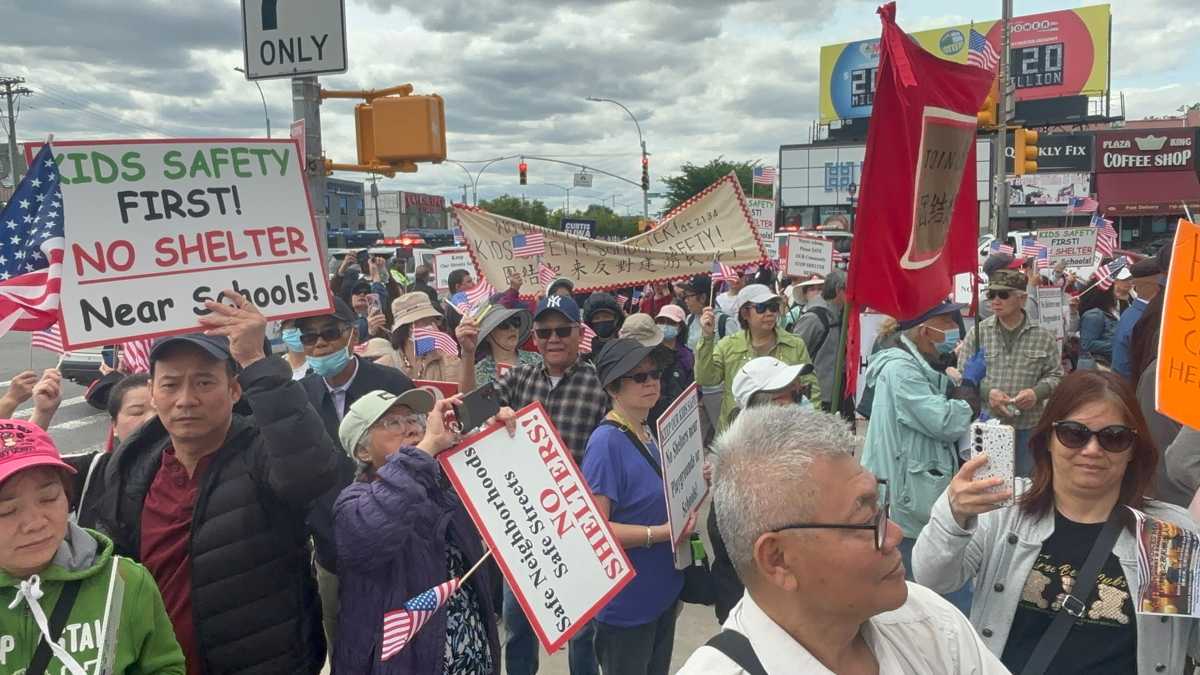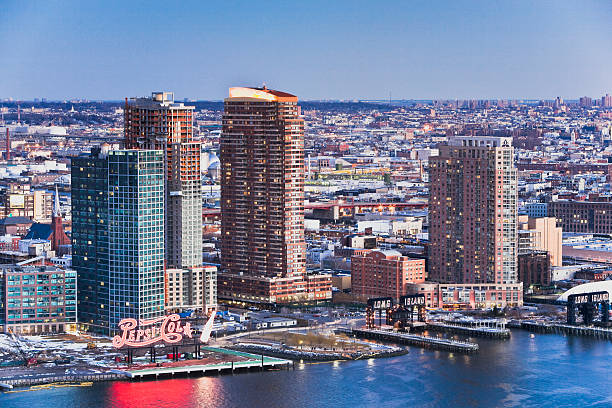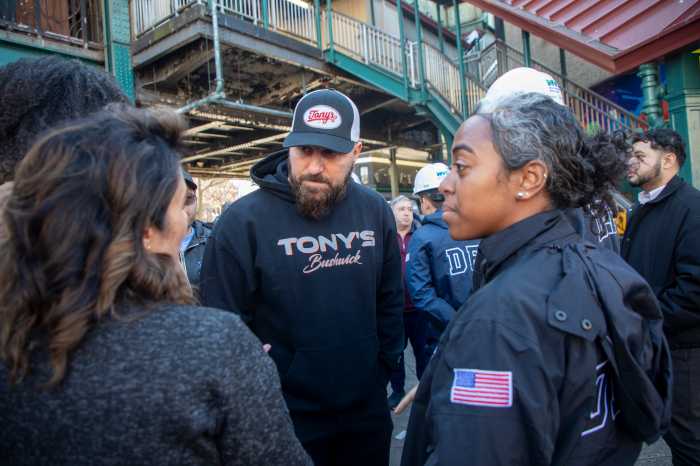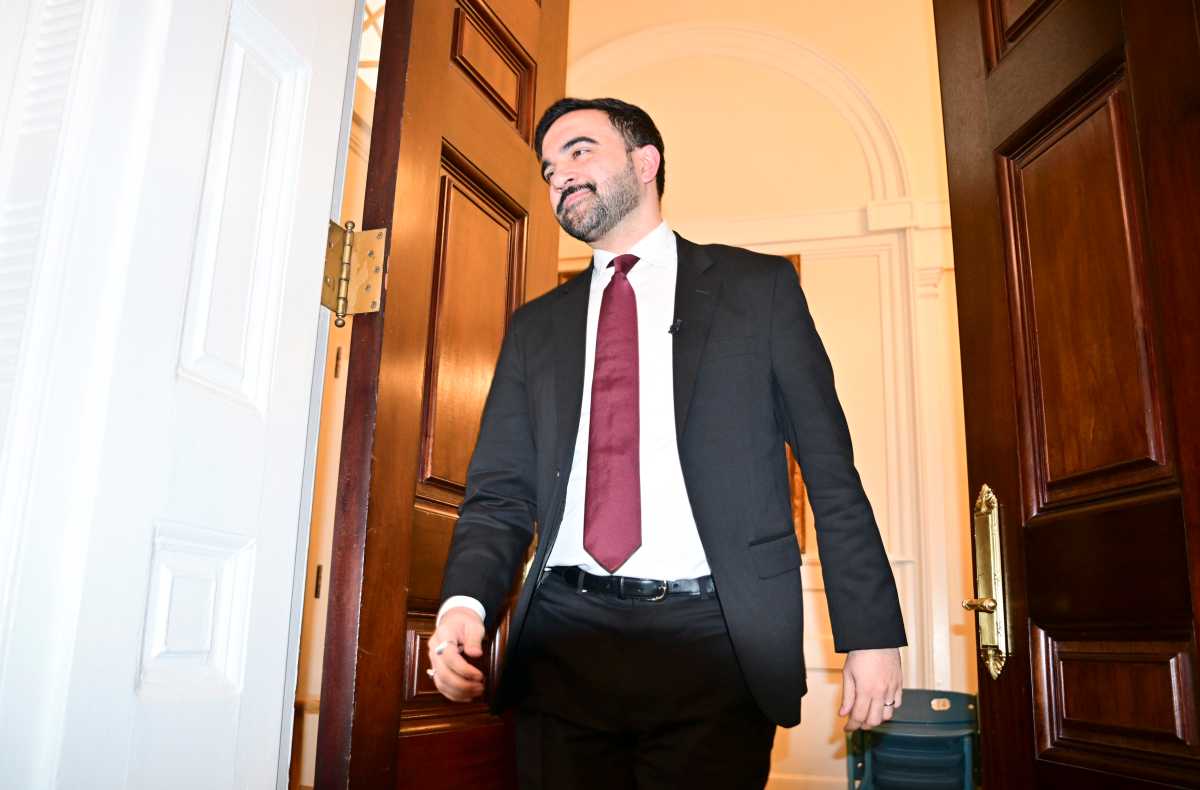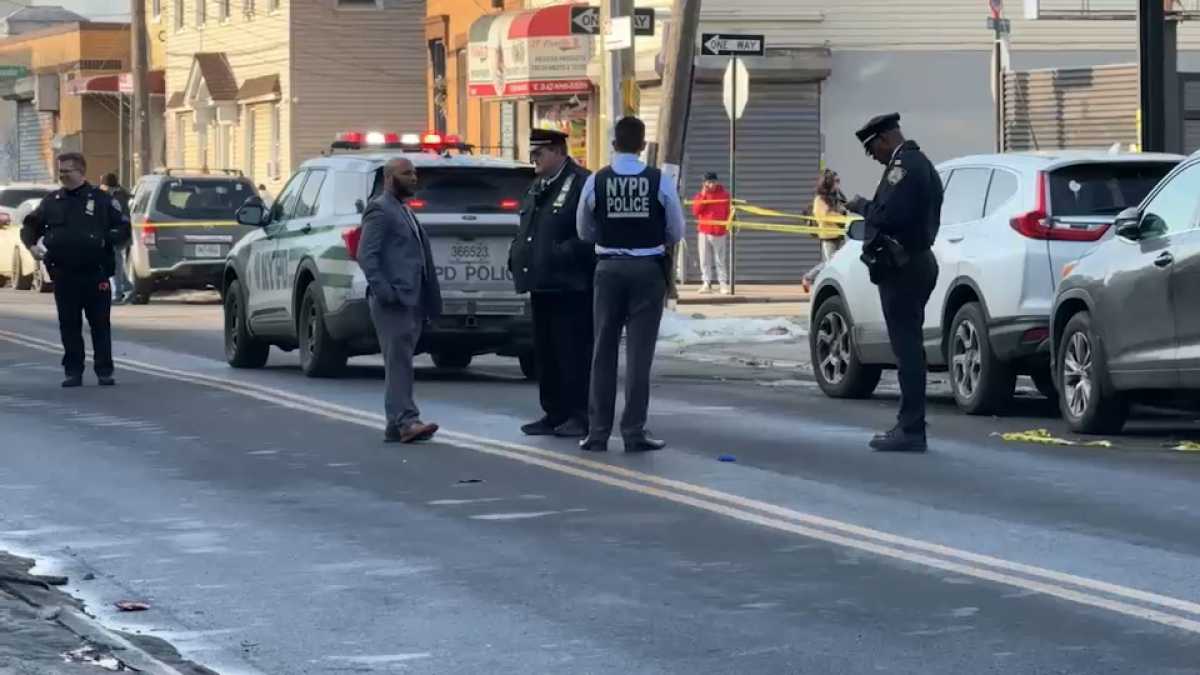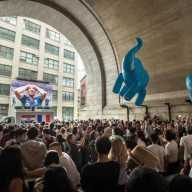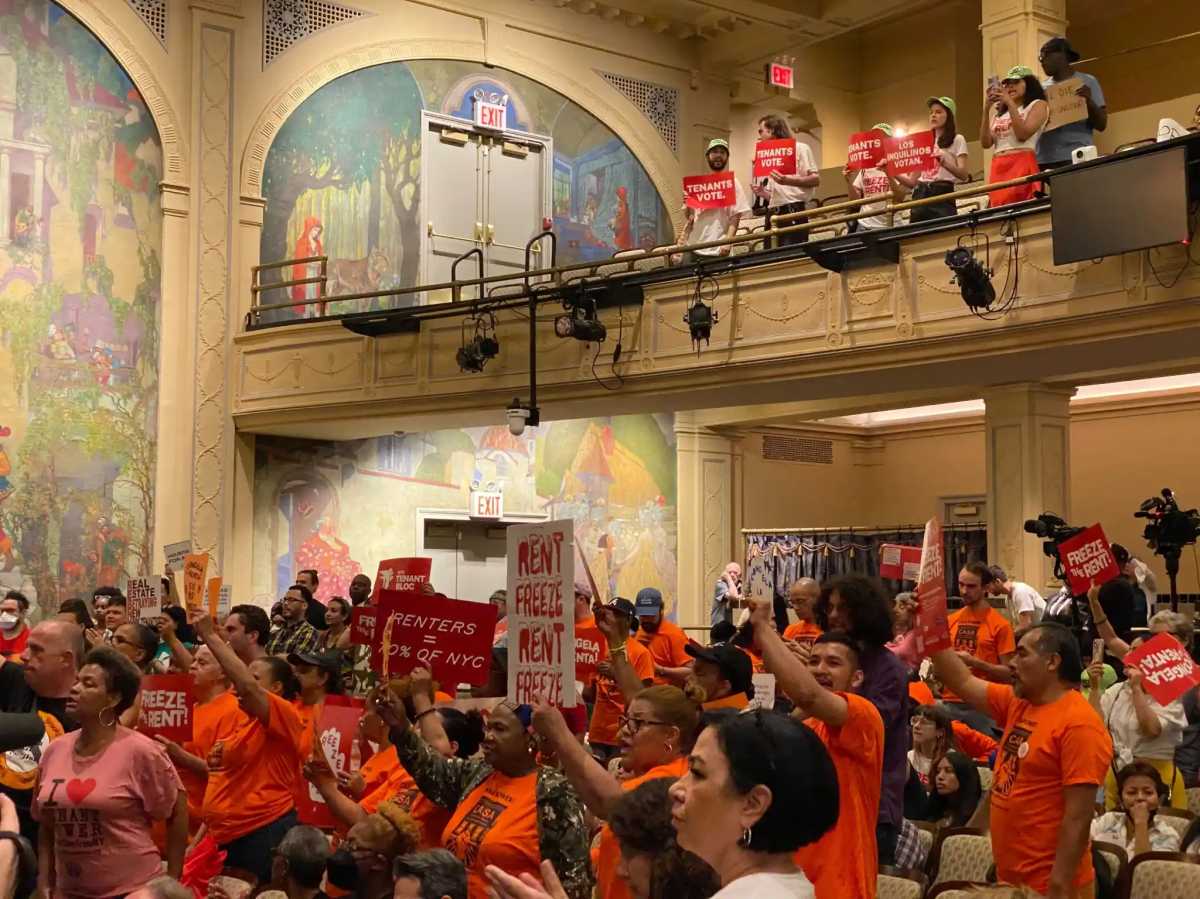About 1,500 demonstrators marched through southern Brooklyn on Sunday to protest a trio of issues: the city’s proposed “City of Yes” zoning changes, the placement of homeless shelters in residential neighborhoods, and the siting of lithium-ion battery storage facilities near homes and schools.
The demonstration, dubbed the “Battle for Brooklyn – The Trifecta,” consisted of two groups that began at the site of a proposed shelter at 2134 Coyle St. and at the intersection of Flatbush Avenue and Quentin Road. The groups merged at Avenue T before proceeding north on Flatbush Avenue to Kings Plaza, temporarily shutting down sections of Avenue U and Flatbush Avenue.
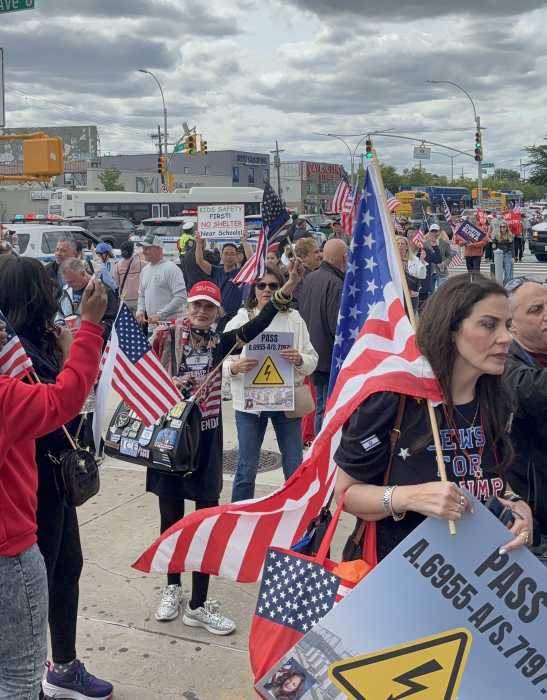
The rally was organized by grassroots group New Yorkers First in partnership with Save South Brooklyn, American Voices Matter, local civic groups and Assembly Member Jaime Williams. Williams is the sponsor of a bill in the Assembly aimed at restricting the construction of battery storage facilities in residential areas like Marine Park and Gravesend.
Marchers from neighborhoods including Marine Park, Mill Basin and Sheepshead Bay carried signs, banners and American flags while chanting, “No Batteries, No Shelters, No ‘City of Yes,'” and “No BESS, No YES, No Shelters.”
Critics sound alarm on ‘City of Yes’ snowball
Critics of Mayor Eric Adams’ “City of Yes” initiative — a proposed overhaul of New York City’s zoning laws — say the plan would limit community input, reduce the influence of local community boards and open the floodgates for aggressive development driven by private interests.
“Make no mistake — this is about dismantling the American Dream,” said rally organizer Ron Canterino, president of New Yorkers First. “They’re gutting our neighborhoods without consent. One- and two-family homes are being sacrificed for profit.”
Paul Graziano, an urban planning consultant and Queens resident who is leading a citywide lawsuit to block the zoning changes, addressed the crowd during the rally.
“This is not a partisan issue. This is a people issue,” Graziano said. “Whether you’re Democrat, Republican, or a ham sandwich — if you support this, you’re against the people of this city.”
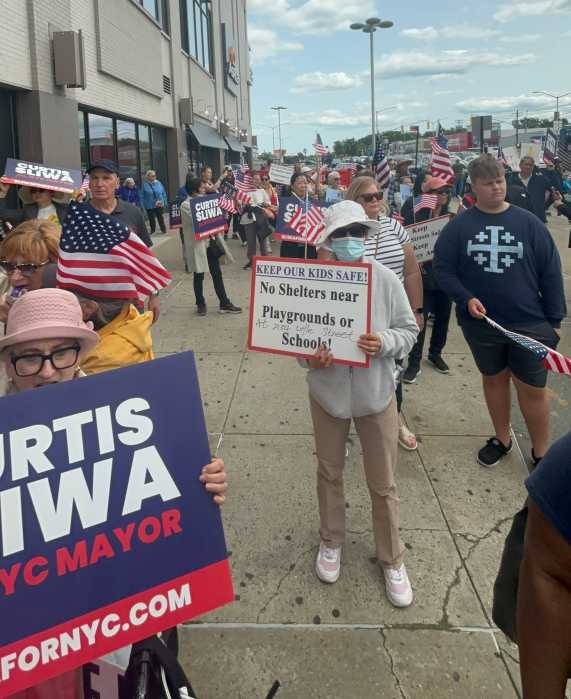
City officials say the “City of Yes” plan aims to update outdated zoning rules and make it easier to build a wider range of housing types across the city. But opponents said the plan could exacerbate other challenges already facing southern Brooklyn communities.
Graziano also claimed proposed zoning rules would allow lithium-ion battery storage facilities — which opponents say present extreme fire risks — to be built “as of right” on lots under 10,000 square feet, including in residential neighborhoods.
“Your neighbor’s house could be torn down and replaced with a battery farm,” he said. “That’s the nightmare the ‘City of Yes’ creates.”
The protest began at 2134 Coyle St., where residents say a planned affordable housing project was converted into a 169-unit homeless shelter without community consultation. Similar to ongoing protests at the site of a separate proposed homeless shelter on 86th Street in Gravesend, opponents have vowed to continue pushing back. Both sites have seen a number of demonstrations and arrests in recent months, as residents call for greater oversight and transparency in the city’s shelter siting process.
“This is betrayal,” Williams said. “They’re building shelters without oversight, without input, right next to schools and daycares. These aren’t solutions — they’re payouts to developers and [non-governmental organizations] who profit off the homeless.”
But city officials and shelter operators defend the plan. A Department of Homeless Services spokesperson told Brooklyn Paper last month that the city informed the community about the Coyle Street shelter plans in July 2023. At a March meeting of Community Board 15, Jim Coughlin, COO of Westhab Inc. — the nonprofit that will operate the shelter — said the community “needs” the facility.

Westhab operates transitional housing with case managers and services to help residents find jobs and permanent housing. The vacant building sits near a Dollar Tree, across from Thrifty Beverage Center, and close to several daycare centers and schools. While residents acknowledge the homelessness crisis, many argue a large-scale shelter is not a fit for a quiet, family-oriented neighborhood.
A DHS spokesperson noted that Council District 46 has no long-term shelters, and the Coyle Street site will provide space for 169 families with children, prioritizing placement of those with community ties.
The nonprofit shelter will offer counseling, housing assistance, medical and mental health services, life skills workshops, children’s services, and 24/7 security with at least five officers on shift and 125 security cameras. Westhab has also promised to maintain an open line for community complaints.
“While these protesters have every right to publicly express their views and opinions, they must do so peacefully and in a manner which complies with the law,” the spokesperson said. “In accordance with a recently issued court order, the developer is allowed to enter the property free of any impediments. We will continue to communicate openly with all stakeholders and elected officials.”
‘This is just the beginning’
Elected officials from outside Manhattan voiced concern that outer boroughs are being disproportionately targeted for zoning changes and lithium-ion battery storage (BESS) facilities. Organizers cited at least 38 proposed sites on Staten Island, eight in Queens, and 12 in Brooklyn, including a NineDot Energy facility in Marine Park.
State Sen. Steve Chan said the city’s shelter and zoning policies are being driven by financial incentives.
“It’s not about helping the homeless. It’s a money game,” Chan said. “$700 a day per shelter occupant — that’s $22,000 a month. Meanwhile, veterans sleep in parks.”
Speakers on Sunday called on lawmakers to advance Assembly Bill A.6955 and Senate Bill S.7197, which would prohibit BESS facilities within 1,000 feet of residential areas. If passed, the bills could limit future development of battery storage facilities in much of the city.
A lawsuit filed by New Yorkers First and more than 200 civic groups is scheduled to be heard July 8 in Staten Island Supreme Court. Rally leaders urged supporters to attend in person.
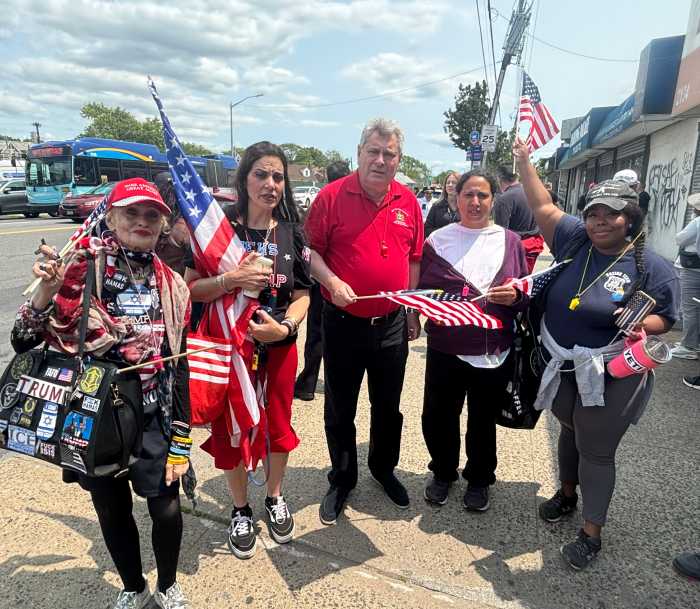
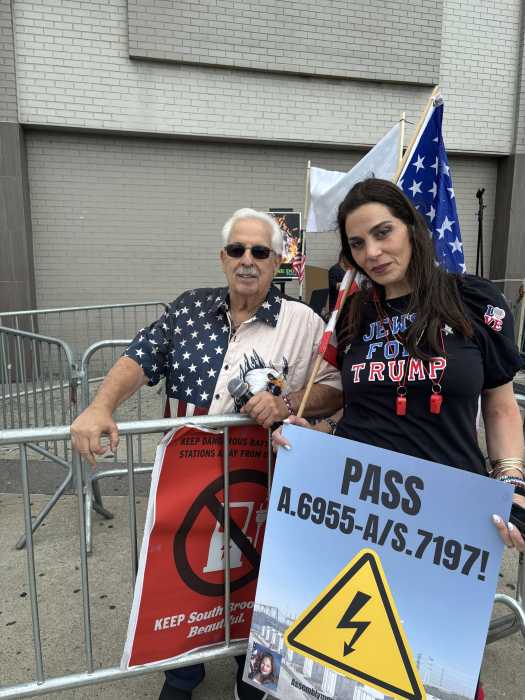
“This is just the beginning,” said Canterino. “We’re going borough by borough. If they can shut us out of the process, we will shut down their streets.”
The protest drew participants from across the city, including Sheepshead Bay, Staten Island and Southeast Queens. Organizers described the event as the start of a broader citywide effort to oppose zoning changes and new shelter or battery storage sites near residential neighborhoods.
Also among the speakers at Sunday’s protest was Guardian Angels founder and mayoral candidate Curtis Sliwa. Despite invitations being sent to all, organizers say Sliwa was the only declared 2025 contender to attend.
Wearing a blue jacket to show support for the NYPD, Sliwa rallied the crowd with a defiant message.
“They will not push us out,” he said. We will improve — not move!”
With reporting by Kirstyn Brendlen and Megan McGibney


